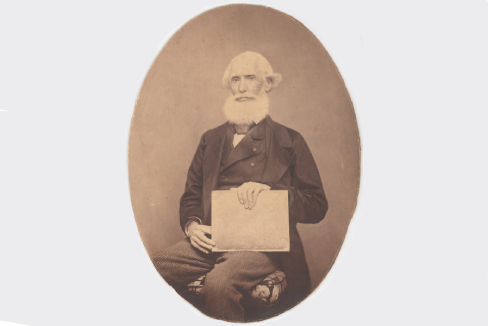About the George Finlay Papers

The George Finlay Papers contain materials created by and related to the British Historian and Philhellene George Finlay, his father John Finlay, Greek-American Philhellene George Jarvis, and British Philhellene Captain Frank Abney Hastings, dating from 1791 to 1949. Most of the collection consists of George Finlay’s meticulous records of his travels, personal and official correspondence, his personal expenditures, copious memoranda on strategy and on military and political organisation, journal entries, maps, facetiae, scrapbooks, personal notes on people—Greeks and others—and on revolutionary events, newspaper cuttings mainly on Greece and international affairs, as well as Finlay’s original manuscripts of the History of the Greek Revolution (1861) as well as corrected proofs of Finlay’s other published works.
Also included are the papers of Finlay’s father, John, two journals of Greek American philhellene, George Jarvis, and those of Finlay’s fellow British philhellene, Captain Frank Abney Hastings. The Hastings papers, which Finlay purchased in 1830, include personal and official correspondence, ship’s logs, notes that he took on board or ashore, as well as memoranda on strategy and on the naval organisation of the revolutionary forces. Collectively, these records reveal a great deal about the character, motivations, ideas, as well as the military and political judgements of these British individuals, as well as of many others, both British and Greek, with whom they interacted during the Greek War of Independence as well as many of Finlay's other interests, such as Classical and Byzantine history, natural history and politics.
James MacGregor to George Finlay. 22 September n.y. Lord Brougham would like George Finlay to visit him. Personal news (stuck on front flyleaf of Brougham, Political Philosophy, London, 1843).
Clipping of letter to The Times from 'Senex' concerning Lord Melbourne and Lord Brougham, 8 April 1869 (previously loose in Brougham, Political Philosophy, London, 1843).
Clipping of letter to The Times from M. D. Hill, concerning Lives of Lord Lynhurst and Lord Brougham by Lord Campbell, 1869 (previously loose in Brougham, Political Philosophy, London, 1843).
Clipping on The Late Lord Brougham and his Dentist (previously loose in Brougham, Political Philosophy, London, 1843).
Clipping on The Late Lord Brougham and his Dentist (previously loose in Brougham, Political Philosophy, London, 1843).
Newspaper clipping of Lord Brougham's arguments on sugar and the slave trade (previously loose in Brougham, Political Philosophy, London, 1843).
Newspaper clipping on 'The Memory of Canning and the Conduct of Peel' and 'Lord Stanley's Protest against the Corn Bill' (previously loose in Brougham, Political Philosophy, London, 1843).
Clipping on The North of Italy and the Crown and Government Security Bill, The Times, 12 April 1848 (previously loose in Brougham, Political Philosophy, London, 1843).
Ernest Beule to George Finlay. n.d. Discusses George Finlay's collection of drachmae and problem of weight of copper coins; requests casts of Greek coins (in French, stuck on front flyleaf of E. B., Les Monnaies d'Athènes, Paris, 1858).
Visiting card of Ernest Beule (stuck on front flyleaf of E. B., Les Monnaies d'Athènes, Paris, 1858).
Death notice of M. Beule, 1874 (stuck on front flyleaf of E. B., Les Monnaies d'Athènes, Paris, 1858)
Press cutting on protest of M. Beule against the removal of statues of Plantagenets from Fontevrault (stuck on front flyleaf of E. B., Les Monnaies d'Athènes, Paris, 1858).
G. Wagner to George Finlay. n.d. Invitation to dine with Queen of Prussia (previously stuck on front flyleaf of J. von Muller, Sämmtliche Werke, Pt. 21, Tübingen, 1816).
Obituary of the Earl of Ellenborough, 1871 (previously loose inside John Hobhouse, Historical Illustrations of the Fourth Canto of Childe Harold, London, 1818)
Several pages from beginning of book. Two visiting cards of Mr le Dr Hopf, contents written by George Finlay, two letters from Carl Hopf in German, dated 3 August 1852 and 24 February 1863 (Previously bound into De historiae ducatus Atheniensis Fontibus, Bonne, 1852).
8 clippings of letters to The Times concerning Byron's "Childe Harold" and Byron's "Lines to the Ocean", 1873 (previously loose inside The Complete Works of Lord Byron, Paris, 1835)
2 loose foolscap sheets in George Finlay's hand (with later notes locating Antiquities in British School at Athens: the last check and annotation of these Antiquities appears to have been made on 13 March 1948 by either Clarke or Cook). Some items have since been incorporated into the School collection, and can be traced by working through the card index to the Museum, in which they are noted as being 'From Finlay's collection'.
List of Antiquities (2 foolscap sheets).
Paginated by George Finlay pp. 1-30; pp. 6bis-16, bound-up quires of handwritten lists with some newspaper cuttings pasted up, with 1 side loose listing George Finlay's donations (taken from FIN/GF/C/6).
Catalogue of Implements of Stone found in Greece in the possession of George Finlay. [Presented by R. C. Bosanquet, April 1930.]
The notes of George Finlay on inside covering sheet give details of his donations to Archaeological Society of Athens; Society of Antiquaries, Zürich ; Mr. Westropp; Albert Dumont; Sir John Lubbock Bart.; Edward J. Stevens Esq., Blackmore Museum, Salisbury; John Evans Esq., British Museum (sent to Mr. Frank Christy's Collection) ; and adds 'Detailed Account of Donations to May 1874 in General Catalogue of Coins, p. 211' [= FIN/GF/C/14 (R. 9.33)].
See also FIN/GF/C/6 for lists of donations.
Printed pamphlets and offprints.
Clipping on 'The Cape Constitution' from The Times, 8 January 1852 (previously loose inside Greek, Ionian and Turkish Papers 1862-1863, London)
Clipping on 'The Recal (sic) of Sir Harry Smith' (previously loose inside Greek, Ionian and Turkish Papers 1862-1863, London)
Clipping on 'The Recal (sic) of Sir Harry Smith' (previously loose inside Greek, Ionian and Turkish Papers 1862-1863, London)
Clipping on 'The Caffre War' (previously loose inside Greek, Ionian and Turkish Papers 1862-1863, London)
Clipping on 'The Caffre War', The Liverpool Mail, 15 May 1852 (previously loose inside Greek, Ionian and Turkish Papers 1862-1863, London)
Clipping on 'Turkey in Asia', April 1854 (previously loose in Heinrich Kiepert, Memoir über die Construction der Karte von Kleinasien und Turkisch Armenien, Berlin, 1854)
29 clippings on international relations in Europe in the 1840s (previously loose in Correspondence Relative to the Affairs of the Levant, 1833-1841, London 1841).
Letter from Diomedon Kysiakos to George Finlay, Athens, 8 / 20 April 1865. (previously loose in E. Puillon Boblaye, Recherches géographiques sur les ruines de la Morée, Paris, 1836.)
Scrap addressed to the English Embassy in Greek (previously loose in Protocols and Papers on the affairs of Greece, London, 1826-1846)
Church to George Finlay, no date. (previously loose in Correspondence Respecting the Relations between Greece and Turkey, 1854, London, 1854)
Note on ancient lead weights (previously loose in An Essay on the Ancient Weights and Money, by Robert Hussey, Oxford, 1836).
Note on ancient weights (previously loose in An Essay on the Ancient Weights and Money, by Robert Hussey, Oxford, 1836).
? to George Finlay, Athens, 18th July, 1844 (previously loose in Correspondence Relating to the Recent Events in Greece, 1843-44, London, 1844)
Clipping on 'Antiquities from Cyprus,' The Times, 14 December 1872 (previously loose in by Charles Newton, Travels and discoveries in the Levant, vol. I, London, 1865)
XXVI Tags Befehl für das Königl. Greich. Heer. (previously loose in Αιών. Athens, 1838 - [1887]). Bilingual in Greek and German
Stephanos A. Kumanudes to George Finlay, 8 June 1872. Requests a copy of an article on his sepulchral inscriptions. (previously loose in Αττικής επιγραφαί επιτύμβιοι, Athens, 1871)
Manilla paper enclosure with cuttings pasted and loose and letters and draft letters loose, on the dispute over the change in postal fees for newspapers being send abroad. 1867-1868.
(Previously bound in Correspondence Relative to the Affairs of Greece, London, 1865). 6 letters, 5 cuttings, 2 notes
Green folder with cloth case (broken), green leather spine, gilt lettering on front and on spine 'Schlieman's [sic] Discoveries at Troy'.
Excavations at Troy, photographs, plans and notes by George Finlay, newspaper cuttings (much rubbed).
Letters (loose) and a paper folder (bound together) labelled 'Translation of Dr von Hahn's Researches at the Troad and correspondence'.
Notes and a letter on events in Crete, the Greek church, consumption of ammunition by Greek troops, Greek newspapers, artillery in Corinth, anecdote on English bulldogs, and the structure of the Greek court.
Letter from Gustave Deville to George Finlay, 30 May, 1866, Athens. Sends Finlay his study on the Tsakonian dialect. (previously loose in Papers Relative to the Mission of the Right Honourable W. E. Gladstone to the Ionian Islands, London, 1861)
Former binding, with sheets of pasted clippings and notes. Clippings cover populations of the Ionian islands, the secretaryship of the Ionian islands, revolt against the British, election results in the islands, insurrection in Cephalonia. Notes on the islands and some book titles on the Ionian islands. Visiting card of G. Ferguson Bowen. (From George Ferguson-Bowen, The Ionian Islands under British Protection, London, 1851)
Pamphlet. British Museum, Guide to the Christy Collection of Prehistoric Antiquities and Ethnography Temporarily Placed at 103 Victoria Street, Westminster. Printed by order of The Trustees of the British Museum, 1868, pp. 1-24.
Pamphlet. Day, Robert Jun., 'Description of a bronze figure, said to have been found at Clonmacnoïse'. [From the Journal of the Historical and Archaeological Association of Ireland, no. 5, January 1869, pp. 1-24+1 illustr.]
Pamphlet. Day, Robert Jun., 'On some ancient personal ornaments of glass found in Ireland'. [From the Journal of the Historical and Archaeological Association of Ireland, no. 6, April 1869, pp. 1-4+1 coloured plate.]


